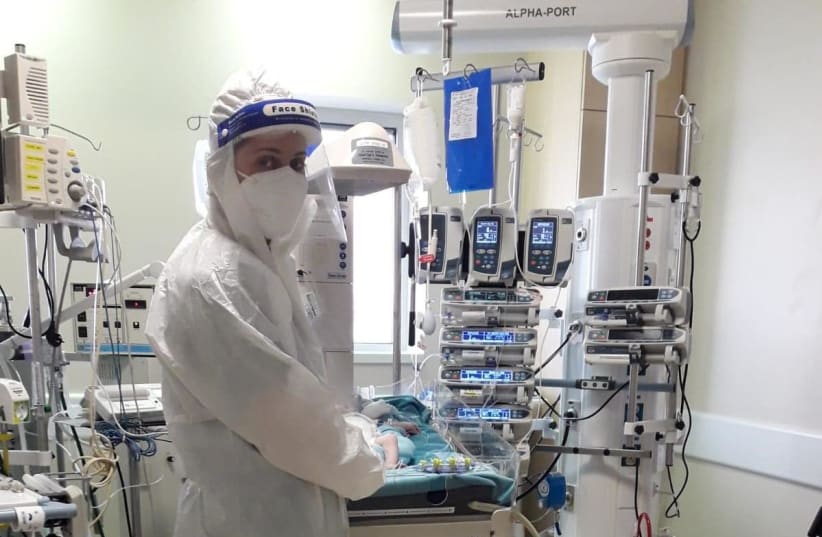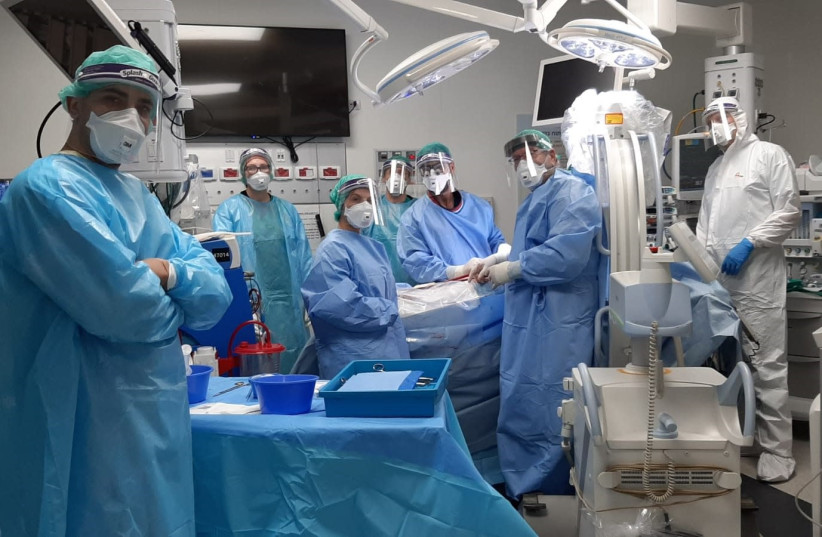Israel lost its first citizen to post-COVID syndrome over the weekend, as cases continue to decline, and the government pushes to roll out the Green Class outline in several green municipalities already on Sunday.
Aden Jamal Fayumi, 16, from Jaljulya, died Saturday morning after being diagnosed with post-COVID syndrome, Schneider Children’s Medical Center of Israel reported.
עדאן ג'אמל פיומי, בן 16 מג'לג'וליה, הוא הנער שמת לאחר שלקה בתסמונת פוסט קורונהhttps://t.co/fEbOf9c43N@hadasgrinberg pic.twitter.com/4GppHpVy2h
— כאן חדשות (@kann_news) October 9, 2021
The unvaccinated teenager had been transferred to the hospital’s intensive care unit about two weeks ago from Meir Medical Center. He is the first Israeli to die from the rare condition: pediatric inflammatory multisystem syndrome, also known as PIMS.
His situation had deteriorated, and he was connected to a heart-lung ECMO machine about 10 days ago.
PIMS is still considered rare. Fewer than 100 Israeli children are known to have been diagnosed with post-COVID syndrome, but around half of these cases have been during the Delta wave.
“I think we are seeing a rise in PIMS in recent weeks,” Schneider’s Dr. Ofer Schiller said following Fayumi’s death.
In February, the United Kingdom reported that up to 100 children a week were being hospitalized with the disease.
On Wednesday, a six-month-old baby was hospitalized in critical condition from the same syndrome and was connected to an ECMO machine at Sheba Medical Center in Tel Hashomer. The baby’s condition deteriorated overnight Friday, and the hospital said he was taken into surgery in very serious condition. By Saturday morning, Sheba doctors said they were fighting for the baby’s life.
PIMS is a multi-organ infection. Its features are similar to those of Kawasaki disease – an acute and usually self-limiting vasculitis of the medium caliber vessels, which almost exclusively affects children – and toxic shock syndrome, a rare, life-threatening complication of certain types of bacterial infections.
The first symptoms are a high fever, coughing and difficulty breathing. Ultimately, the syndrome can affect the heart, digestive, nervous and respiratory systems. The disease usually occurs a few weeks after being infected with COVID and can occur in children who were either symptomatic or asymptomatic while they had the virus.
Schiller said the hospital shares in the sorrow of the teenager’s family.
“I call on everyone to go out and get vaccinated,” the doctor said.
Some 7% of Israel’s serious and critical COVID-19 cases were vaccinated with three shots of the coronavirus vaccine, according to data released Friday morning by the Health Ministry.
“I cannot say that 7% is a lot,” Health Minister Director-General Prof. Nachman Ash told The Jerusalem Post. “The vaccine, even the third shot, does not work at 100%. It is 95% effective.”
He said that there are also always a small percentage of people for whom the vaccine does not work, such as those who are immunosuppressed.
More than three million Israelis have been fully vaccinated with two shots and a booster. There were around 460 serious and critical cases on Friday. Seven percent is around 32 people, meaning less than 0.00001% of people who have had a third shot are in serious condition.
“This is even better than we could have expected,” Ash said.
Another 17% were vaccinated with two shots more than six months ago, according to the data.
The majority (71%) were unvaccinated. The rest were recovered (3%), vaccinated and got sick before a full week had passed (2%) or recovered and were vaccinated (1%).
Some 6.1 million Israelis have had a first shot, 5.7 million two shots and 3.7 million all three shots.
In general, the virus seems to be declining even as children have returned to school after the holidays. However, the number of patients connected to life-saving heart-lung ECMO machines is at a peak, with close to 60 people being connected last week, according to Ash.
He said that 90% of ECMO cases are unvaccinated and under the age of 60, and 20% are under the age of 40.
There were 1,990 people diagnosed with the virus on Friday, the Health Ministry said Saturday night, with 2% of those screened testing positive. There were around 30,000 active cases of coronavirus in Israel. Of the 464 serious cases, 195 were intubated.
The death toll stood at 7,885
“In the merit of the vaccines, we managed to refrain from rolling out more severe restrictions,” Ash told the Post.
He said that only a month ago, the ministry was pushing to prevent large gatherings – a recommendation that was not accepted – but “now we have passed the peak and the numbers are going down. Of course, we do not see any reason for new restrictions. We agree with the government that now we should lighten restrictions rather than increase them.”
TO THAT point, Israeli children living in green cities learned late Thursday night that they will no longer have to enter isolation if one of their classmates contracts the coronavirus, according to a decision announced by the Prime Minister’s Office and Health Ministry.
“Determination paid off: A model for shortening isolations that we had been asking for since July was brought forward and will be launched in an extended manner in all the green localities as early as this coming Sunday,” Education Minister Yifat Shasha-Biton posted on Facebook Friday morning. “Every effort is being made to expand it to all educational institutions in the country, to bring maximum school days to our children and make it easier for their dear parents.”
According to the outline, starting Sunday, if a student in one of the approved classrooms in these cities tests positive for COVID, everyone in the class will be asked to take a PCR test. Everyone whose test is negative will be able to return to their normal school routine but will need to be tested with a rapid antigen test daily for five days to ensure they do not have the virus.
On day seven, a second PCR test will confirm the class is virus-free. If it is, then the whole class can resume learning as usual.
If there are four or more students with the virus, the Green Class protocol will not apply.
There are nearly 300 green cities that will qualify for the program, according to a list distributed Friday morning by the Education Ministry. However, only around 130 municipalities will begin the outline on Sunday.
It is still unclear exactly which schools will participate in the outline. Also, in order for a school to participate, 80% of parents need to authorize their commitment.
Finally, many of the home tests that need to be distributed for the program to work have not yet been delivered and are not expected until later in the week. This means that some schools that will be included in the program will not actually be starting until the end of this week or beginning of next week.
In September, Israel peaked with around 155,000 students in isolation.
On Thursday, the Health Ministry reported that there were more than 92,000 children and teachers in isolation and that 1,359 students had tested positive the day before.

